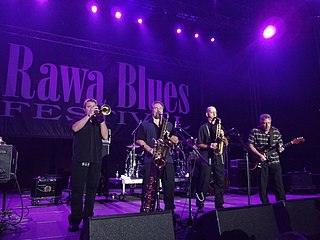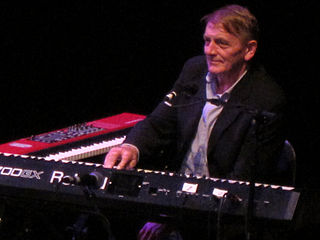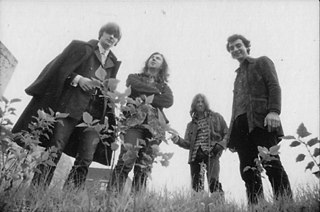
Funk is a music genre that originated in African American communities in the mid-1960s when musicians created a rhythmic, danceable new form of music through a mixture of various music genres that were popular among African Americans in the mid-20th century. It deemphasizes melody and chord progressions and focuses on a strong rhythmic groove of a bassline played by an electric bassist and a drum part played by a percussionist, often at slower tempos than other popular music. Funk typically consists of a complex percussive groove with rhythm instruments playing interlocking grooves that create a "hypnotic" and "danceable" feel. It uses the same richly colored extended chords found in bebop jazz, such as minor chords with added sevenths and elevenths, and dominant seventh chords with altered ninths and thirteenths.

Blood, Sweat & Tears is an American jazz rock band founded in New York City in 1967, noted for a combination of brass with rock instrumentation. BS&T has gone through numerous iterations with varying personnel and has encompassed a wide range of musical styles. Their sound has merged rock, pop and R&B/soul music with big band jazz.

Iron Butterfly is an American rock band formed in San Diego, California, in 1966. They are best known for the 1968 hit "In-A-Gadda-Da-Vida", providing a dramatic sound that led the way towards the development of hard rock and heavy metal music. Although their heyday was the late 1960s, the band has been reincarnated with various members with varying levels of success with no new recordings since 1975. Their second album, In-A-Gadda-Da-Vida (1968), remains a best-seller, and Iron Butterfly was the first group to receive an In-House platinum album award from Atlantic Records. Their music has found a significant impact on the international rock scenes, influencing numerous acts such as Black Sabbath, AC/DC, Rush, Alice Cooper, Mountain, Uriah Heep, Soundgarden, Stone Temple Pilots and Queens of the Stone Age.

The Archies is a fictional American rock band that features in media produced by, and related to, Archie Comics. They are best remembered for their appearance in the animated TV series The Archie Show. In the context of the series, the band was founded by vocalist/guitarist Archie Andrews, drummer Jughead Jones, bassist Reggie Mantle, vocalist/percussionist Betty Cooper and vocalist/keyboardist Veronica Lodge. In the cartoons, Veronica is shown playing a large keyboard instrument styled after the X-66, a then-current top-of-the-line organ made by the Hammond Organ Company.

Renaissance are an English progressive rock band, best known for their 1978 UK top 10 hit "Northern Lights" and progressive rock classics like "Carpet of the Sun", "Mother Russia", and "Ashes Are Burning". They developed a unique sound, combining a female lead vocal with a fusion of classical, folk, rock, and jazz influences. Characteristic elements of the Renaissance sound are Annie Haslam's wide vocal range, prominent piano accompaniment, orchestral arrangements and vocal harmonies.

Green Carnation is a Norwegian progressive metal band from Kristiansand, formed in 1990. Green Carnation's trend of music has continuously changed on every release one by one; from straight forward death metal in their demo, to death-doom, then a progressive doom metal sound, to an atmospheric gothic metal sound, to a melancholic hard rock sound and in 2006, went as far as to releasing an entirely acoustic album Acoustic Verses. The band released its first album in 14 years titled Leaves of Yesteryear on May 8, 2020, which marked a return to their earlier gothic progressive metal roots. A new single was composed, arranged, rehearsed and recorded during the COVID-19 pandemic, called "The World Without a View", and released digitally on December 18, 2020.

Tony! Toni! Toné! were an American soul/R&B band from Oakland, California, popular during the late 1980s and early to mid-1990s. During the band's heyday, it was composed of D'wayne Wiggins on lead vocals and guitar, his brother Raphael Saadiq on lead vocals and bass, and their cousin Timothy Christian Riley on drums, keyboards, and background vocals. Originally, the band went by "Tony, Toni, Toné" as a joke, until they realized it "had a nice ring to it".

The Mothers of Invention was an American rock band from California. Formed in 1964, their work is marked by the use of sonic experimentation, innovative album art, and elaborate live shows.
Tom Constanten is an American keyboardist, best known for playing with Grateful Dead from 1968 to 1970, for which he was inducted into the Rock and Roll Hall of Fame in 1994.

Sumo was a 1980s Argentine alternative rock band, heavily influenced by post-punk and reggae. Led by Italian-born Scottish Luca Prodan, it remained underground for most of its short activity but was extremely influential in shaping contemporary Argentine rock. Sumo is credited with introducing British post-punk to the Argentine scene, mostly by songs with lyrics in English, and with providing a visceral counterpoint to the progressive and nueva canción influences then dominant in the country's rock en español.

The Lost Episodes is a 1996 posthumous album by Frank Zappa which compiles previously unreleased material. Much of the material covered dates from early in his career, and as early as 1958, into the mid-1970s. Zappa had been working on these tracks in the years before his death in 1993.

Roomful of Blues is an American jump blues and swing revival big band based in Rhode Island. With a recording career that spans over 50 years, they have toured worldwide and recorded many albums. Roomful of Blues, according to the Chicago Sun-Times, "Swagger, sway and swing with energy and precision". Since 1967, the group’s blend of swing, rock and roll, jump blues, boogie-woogie and soul has earned it five Grammy Award nominations and many other accolades, including seven Blues Music Awards. Billboard called the band "a tour de force of horn-fried blues…Roomful is so tight and so right." The Down Beat International Critics Poll has twice selected Roomful of Blues as Best Blues Band.

Jack Arthur Walrath is an American post-bop jazz trumpeter and musical arranger known for his work with Ray Charles, Gary Peacock, Charles Mingus, and Glenn Ferris, among others.

Geraint Meurig Vaughan Watkins is a Welsh singer, songwriter, rock and roll pianist and accordionist. He has backed many notable artists, including Nick Lowe, Dave Edmunds, Van Morrison, Mark Knopfler, Paul McCartney, Roy St. John, Shakin' Stevens and most recently Status Quo. He has also pursued a solo career and issued a number of albums under his own name, the most recent of which, Rush of Blood, was released in September 2019.

Brain was a Hamburg-based record label prominent in the 1970s releasing several important Krautrock records by bands such as Neu!, Cluster and Guru Guru. Many of its more prominent records are currently being reissued on CD by Repertoire Records.
Dr. Music was a Toronto jazz group founded in 1969 by producer, arranger and performer Doug Riley. The band recorded three albums and toured across Canada. The personnel of the band changed throughout its history, with Riley remaining at the core of the group.
William Daniel "Smitty" Smith was a Canadian keyboardist and session musician.

Hungária was a Hungarian pop-rock band formed by singer/guitarist/keyboardist Miklós Fenyő in 1967. Despite periodic suppression by the Hungarian Communist regime, by the early 1980s Hungária was one of the country's most popular bands.

Carl Sentance is an English rock singer and current vocalist for Nazareth.

The Moffs were a psychedelic rock band formed in Sydney in 1984. They are perhaps best known for their 1985 song Another Day in the Sun, that attracted local and international underground attention. Led by Tom Kazas, they incorporated many styles during their five-year career: psychedelic rock, progressive rock, blues rock, early post rock, atmospheric rock, 1960s and 1980s pop, free improvisation, impressionistic lyrics, Greek folk music styles, experimental composition and repetitive minimalist structures. The band's name was invented by misspelling the word 'moths'.

















